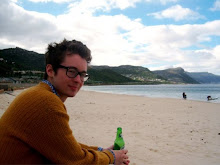nevertheless, i've been reading a good deal on venezuela, and hugo chávez in particular, and finished nikolas kozloff's "hugo chávez: oil, politics, and the challenge to the u.s." a few weeks ago.
kozloff is a sympathetic fellow traveler of chávez and his socialist revolution, a doctor in latin american history, and has lived in and written about venezuela for a number of years. as the title of the book implies, much of the focus concerns the venezuelan economy, which is dominated by petróleos de venezuela (pdvsa), the state oil company which manages the largest oil reserves in the western hemisphere, and accounts for a third of the national gdp.
for years, before chávez and his fifth republic movement came to power in 1998, pdvsa served more-or-less as a personal slush fund for venezuela's oligarchy, and much of the great wealth of the country was exported beyond its borders. nationalized during the first term of president carlos andrés pérez in the 1976, the welfare of the company has often determined the fate of the country.

state control of pdvsa under the chávez administration has meant very different things for venezuela than during pérez's tenure, and instead of using petroleum revenue to bankroll a small national elite, chávez has changed the entire character of the institution, attempting to bring it in-line with the principles of democratic socialism. as kozloff highlights in the first chapter of the book, oil "is a geopolitical weapon" in the venezuela of today, and much of the profits are being re-introduced in society by way of the new "missions."
"mission robinson," for instance, is a a multi-million dollar literacy program that has nearly eradicated illiteracy in the country. "mission barrio adentro" provides free health-care to the poor, and "mission sucre" has established nearly one hundred university campuses to provide higher education classes, completely free and open to all.
i really enjoyed kozloff's "chávez," but it's very much a piece of current affairs literature, and to get a little more background, i read and just finished bart jones' lengthier biography "hugo!: the hugo chávez story from mud hut to perpetual revolution."

jones, a former associated press correspondent, details the rise of hugo chávez frias from his childhood on the llano grasslands of west-central venezuela up until 2008, the tenth year of chávez's presidency, when the book was published. born desperately poor, and largely raised by his grandmother, rosa, chávez grew up wanting to play baseball in america, only to enter military academy at the age of seventeen.
after much disillusionment with the reigning government and a long political radicalization, chávez and number of fellow soldiers in the revolutionary bolivarian movement-200 (the 200 a reference to the anniversary of simon bolívar's birth), launched a failed coup d'état against the venezuelan state in february 1992.
after serving a brief prison term, chávez was pardoned by then-president rafael caldera in 1994, and was elected president in 1998 as a member of the fifth republic movement. after consolidating power in the months after the campaign, chávez began to actively challenge the venezuelan oligarchy, cutting into their profits and redistributing their wealth to the poor.
in response, the venezuelan capitalists launched a coup on 11 april 2002, arresting chávez, dissolving the national assembly and supreme court, and installing pedro carmona, president of the national business council, as interim president. within 48 hours, however, millions of poor people, streaming down from the slums surrounding caracas, encircled the presidential palace, miaflores, and demanded the return of their president. chávez, re-installed as president on 13 april, was challenged again by a bosses' strike in november of that year. surviving it, he purged the leadership of pdvsa, who had helped organize the coup and lockout, and began taking the offensive against the counter-revolutionary elements in the country.
for a wider, regional context to the bolivarian revolution, i've just started another of kozloff's books, "revolution!: south america and the rise of the new left."
only a few chapters in, so no real review yet, but the focus extends beyond venezuela's border, covering morales' bolivia, lula's brazil, and many others, especially in their foreign relations with the united states. exciting stuff!
also, i attended the national conference of the 'hands off venezuela!' solidarity campaign at the university of london last month. it was nearly eight hours of intense debate, discussion, and speech-making, and i got plenty of photos - but that's for another post.

No comments:
Post a Comment